The National Eclipse Blog contains posts on eclipse-related topics of interest. Rest assured that no AI tool was used to generate these blog posts. All of the content was entirely written by a human eclipse expert.
Because major eclipses only occur every couple of years, we don't post here often, but you'll usually notice a flurry of activity in the lead-up to big eclipse events. In the meantime, enjoy our posts from past eclipses.

NationalEclipse.com | Oct 4, 2024
It's estimated that as many as 50 million people experienced the awe-inspiring sight of a total solar eclipse this past April when the Moon's shadow swept across Mexico, the U.S., and Canada. In the moments after seeing totality for the first time, it's not uncommon to hear people vow that they must... Read more
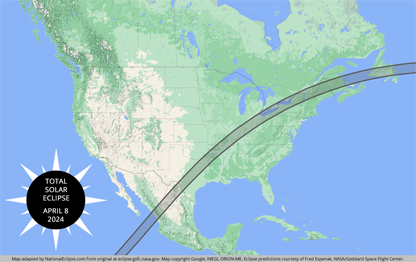
NationalEclipse.com | May 8, 2024
It's already been a month since the long-awaited and much-anticipated 2024 total solar eclipse swept across North America. And what a wild eclipse it was! With eclipse excitement having ebbed to near-normal levels, the one-month mark seems like a good time to provide an overall summary, and my own p... Read more

NationalEclipse.com | Feb 16, 2024
A total solar eclipse is a very precise phenomenon. For hundreds of years into the future, astronomers can predict exactly what time an eclipse will occur, down to the tenth of a second, and exactly where the Moon's shadow will touch the surface of the Earth, down to the foot. Without this data, nob... Read more
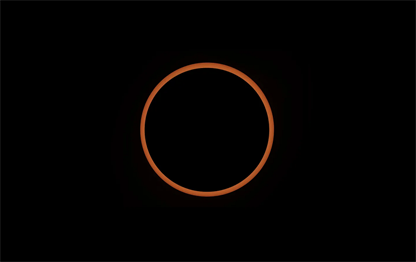
NationalEclipse.com | Sep 14, 2023
We're now less than one month away from the next solar eclipse in America. On October 14, 2023, an annular, or "ring of fire," solar eclipse will cross over eight U.S. states. This eclipse can serve as a "dry run" of sorts for the highly anticipated total solar eclipse that will occur less than six... Read more
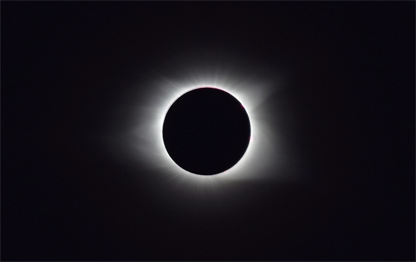
NationalEclipse.com | Apr 5, 2021
In just a few days, the total solar eclipse of April 8, 2024, will be exactly three years away. That's still a long time, but that day suddenly now seems within reach. Those who saw the historic 2017 total solar eclipse in America knew they would have to endure an agonizing seven-year wait for total... Read more

NationalEclipse.com | Jan 14, 2021
Back in 2016, we posted a short article about how the path of the 2017 total solar eclipse would be crossed by the path of the 2024 total solar eclipse, creating a zone of overlapping totality spanning parts of Missouri, Illinois, and Kentucky. Even before the 2017 eclipse occurred, locals were call... Read more
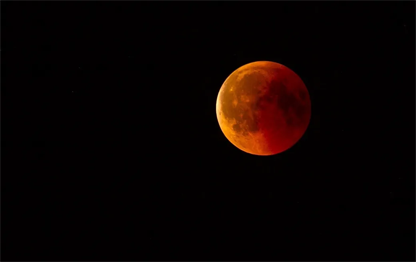
NationalEclipse.com | Nov 5, 2018
On the night of Sunday, January 20, 2019, a total lunar eclipse will be visible from all 50 U.S. states. It's been over three years since lunar totality has been seen across such a wide swath of the country. Of course, more recently, the U.S. witnessed a total eclipse of the solar variety, in August... Read more
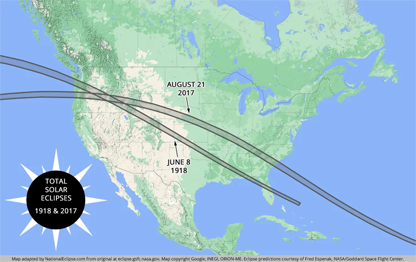
NationalEclipse.com | May 10, 2017
If someone asked you to picture the world in the year 2116, 99 years from now, what would you see? Would you see flying cars and colonies on Mars? The future usually doesn't turn out quite the way we imagine it might. And the world of today probably looks nothing like the Americans of 1918 pictured... Read more
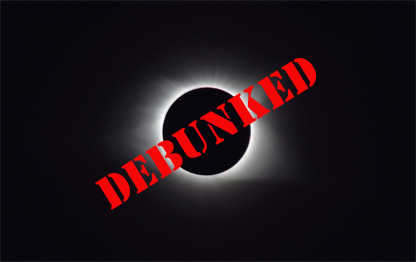
NationalEclipse.com | Apr 4, 2017
In our last post, "Staying Safe on August 21," we called attention to the fact that the media sometimes inadvertently provides incorrect or dangerous information about how to safely view a solar eclipse. Needless to say, this is a disturbing pattern because so many people never think to verify or fa... Read more

NationalEclipse.com | Mar 13, 2017
The most important thing to consider when planning for a solar eclipse isn't your location within the path of totality, your distance to the centerline, or even the weather. It's eye safety. If you attempt to view an eclipse incorrectly, there's a really great chance your souvenir of the eclipse wil... Read more
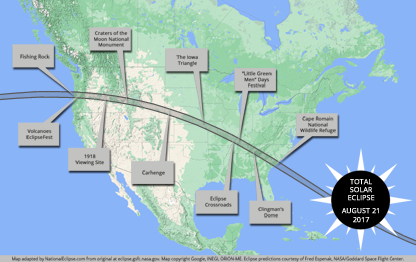
NationalEclipse.com | Dec 6, 2016
With less than a year to go until the 2017 total solar eclipse touches down in the U.S., the obligatory top ten lists of the "best" or "greatest" viewing sites are starting to pop up in the media and around the web. Usually, these lists focus on places with the most promising weather prospects, the... Read more
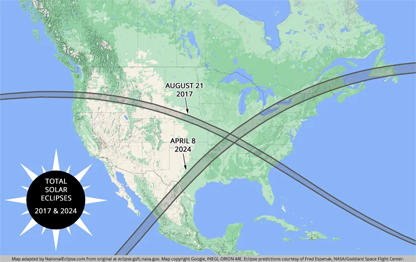
NationalEclipse.com | Jun 28, 2016
It's been said that, on average, a total solar eclipse can be seen from the same place only once every 375 years. The methodology used by whoever calculated this number is unknown and it's debatable whether there can even be a definitive methodology for such a calculation. For instance, how many poi... Read more
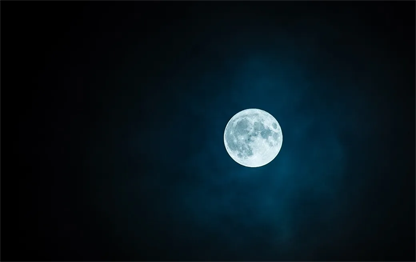
NationalEclipse.com | Mar 25, 2016
This year—2016—Easter Sunday falls on March 27, one of those years when it feels like the holiday arrives too early. In 2008, we had the earliest Easter in almost a century when it occurred on March 23, its earliest arrival since 1913. Next year, we'll celebrate Easter much later, on April 16. We ce... Read more